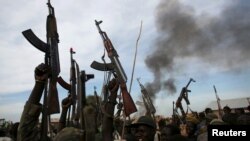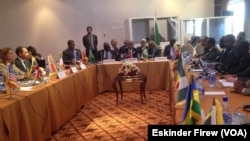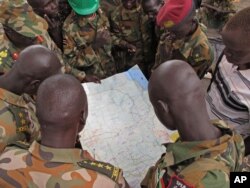A high-level forum to revive South Sudan's 2015 peace agreement is underway in Addis Ababa, Ethiopia – and the stakes could not be higher.
The internal conflict that began four years ago has driven two million people from the country and left more than a million others a step away from famine, according to the United Nations.
The peace agreement signed in Addis two and half years ago fell apart in July 2016 after clashes between supporters of President Salva Kiir and rebel leader Riek Machar left hundreds dead in the capital, Juba.
International Crisis Group senior analyst Casie Copeland says power-sharing and security arrangements will be the key objectives of this meeting. Copeland notes that East African bloc IGAD has made it clear the forum is not a mediation or a new round of peace talks, although the parties all want something different.
“Rebel groups and most Western countries want the forum to be a new mediation. The goal for them is to create a new power-sharing arrangement, which significantly weakens the government’s hand in favor of different opposition groups,” Copeland tells VOA.
“The government, on the other hand, is quite keen that the existing arrangements are only slightly modified and that they remain in a powerful position. Their argument being that they are the militarily dominant party in-country, so why should they give power-sharing to rebels that have not been particularly successful?"
Copeland says IGAD is put in the middle, trying to balance these demands.
Cease-fire possibility
Part of revitalizing the 2015 peace deal is having the parties agree to a cessation of hostilities. But Aly Verjee, a visiting expert at the United States Institute of Peace, is skeptical that will happen.
“Conventional cessation of hostilities agreements have been repeatedly attempted in South Sudan, and similar arrangement is unlikely to succeed where others have failed,” said Verjee. “Merely incorporating the new armed actors in a cessation of hostilities is insufficient for violence to end... Let's not forget the government declared a unilateral cease-fire in May of this year, which was extended in November, and yet violence perpetrated by government forces continued.”
South Sudan analyst Alan Boswell notes that the peace deal was signed between two parties, but since that time, the opposition has fragmented, making the task of the peace mediators even more challenging.
“It is not just that all the opposition groups want to take power themselves; they actually have different positions, in as much as the SPLA-IO under Riek Machar has been primarily interested in sort of taking power through elections after the rebellion failed in Juba,” said Boswell. “Whereas some of these other groups are more interested in sort of forcing a restructuring of South Sudan and gaining more local autonomy, away from Juba.”
Copeland says the forum is focused on conflict prevention as well as resolution, but warns that an election scheduled for next year could present new problems.
“If it is held next year, none of the groundwork has been done for it, and we may see competition within the government or amongst groups that have made a peace agreement with the government over who is going to stand as candidates in different places," she says. " And so the election itself poses a set of conflict risks that do not exist right now."






